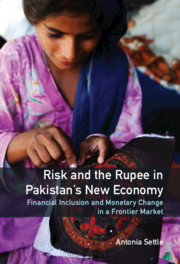 Risk and the Rupee in Pakistan's New Economy
Risk and the Rupee in Pakistan's New Economy Published online by Cambridge University Press: 31 March 2020
The financial inclusion agenda calls for the redress of limited access to financial services, notably amongst the poor. From its humble origins in experimental microcredit in Bangladesh, financial inclusion has become a core component of the development work of governments and non-governmental organisations (NGOs) across the developing world. Driven by key philanthropic and private sector interests alongside the United Nations (UN), the International Monetary Fund (IMF) and the World Bank, the financial inclusion agenda now encapsulates not only microcredit, but also access to microdeposit and microinsurance facilities. This suite of financial tools is designed not only to mitigate the kinds of new risks that have been generated in developing economies as a result of economic and financial liberalisation since the 1980s, but to ‘enable’ and ‘empower’ the world's three billion poor. Celebrated as the ‘key to ending global poverty’ and a ‘revolution for the unbanked’, financial inclusion has become the darling of international development policy.
Financial inclusion's potential as a poverty alleviation tool is premised on its capacities to empower poor households to harness risk. Where the state has wound down welfare policies, and deregulated money and prices through its repeal of subsidies, import tariffs, fixed exchange rates, and fixed interest rates, financial inclusion promises to insulate households against shocks and open up new opportunities for household investment in human capital and entrepreneurship. By enhancing household risk tolerance through access to credit and savings facilities, financial inclusion seeks to spark bottom-up growth at the same time as it offers a safety net. Financial inclusion thus answers to the needs of both social policy and economic policy, marking out money – the basic unit of credit and savings – as the panacea for the new risks faced by households in globalised markets. Yet by engaging access to credit and savings as the tool with which households can attain financial stability amidst the instabilities that are characteristic of open markets, the financial inclusion agenda makes implicit assumptions about the money that constitutes those savings and credit facilities.
In fact, money is not uncontroversial. Rather, the Keynesian tradition, along with the sociological thought on which it draws, marks out money as contested terrain. Indeed, the viability of fiat money demands an unthinking trust in money – a trust long nurtured by central banks in order to ensure the economywide acceptability of money at a stable price.
To save this book to your Kindle, first ensure no-reply@cambridge.org is added to your Approved Personal Document E-mail List under your Personal Document Settings on the Manage Your Content and Devices page of your Amazon account. Then enter the ‘name’ part of your Kindle email address below. Find out more about saving to your Kindle.
Note you can select to save to either the @free.kindle.com or @kindle.com variations. ‘@free.kindle.com’ emails are free but can only be saved to your device when it is connected to wi-fi. ‘@kindle.com’ emails can be delivered even when you are not connected to wi-fi, but note that service fees apply.
Find out more about the Kindle Personal Document Service.
To save content items to your account, please confirm that you agree to abide by our usage policies. If this is the first time you use this feature, you will be asked to authorise Cambridge Core to connect with your account. Find out more about saving content to Dropbox.
To save content items to your account, please confirm that you agree to abide by our usage policies. If this is the first time you use this feature, you will be asked to authorise Cambridge Core to connect with your account. Find out more about saving content to Google Drive.